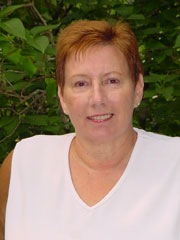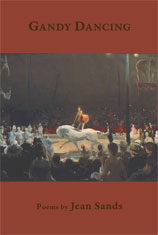|
|
|
|
||||
In her first full-length poetry collection, Gandy Dancing, Jean Sands has pulled out all the stops. The utter honesty of this compelling book is shocking and welcome. One cannot read its poems without being inspired by the courage, resilience, love, and eventual victory they describe in language stripped to the essentials. From the title poem (describing the way the young poet sees a threatening gang of gandy dancer drunks as circus performers) to the last poem in the collection, “I Became the Woman I Am Now,” Gandy Dancing is a song of triumph, the triumph of the human spirit over the worst that life can throw against it. About the book, Cortney Davis writes, “The poems in Jean Sands’ debut collection, Gandy Dancing, are straightforward and strong, revealing and transformative. Her subjects are those of a woman’s life, and yet these poems speak to all readers: in them we encounter childhood’s memories, both dark and light; spousal abuse and the failures of marriage; the intricacies of parenthood; and, in the face of great loss, the ultimate survival of the heart. These poems open out from the personal to the universal, setting the secrets of our everyday lives against the backdrop of an era, one that spans wars and generations, one shaped by the culture and politics of the times. This is a powerful and unforgettable collection. Reading Gandy Dancing, I was reminded that poetry can change our lives.” Honor Moore adds this: “Gandy Dancing is an extraordinary first book, the narrative of an American Everywoman whose life does not often come into poems. In language that is direct, uncommonly modest, and so unsparing it breaks the heart, Jean Sands brings that woman, herself, beautifully, shockingly into the great conversation of American poetry.” And Dick Allen is equally enthusiastic: “As I read and re-read Jean Sands’ poems, the word that comes to me again and again is harrowing. What a harrowing life is shown in these vignettes of sickness, betrayal, longing, and dashed hope. As Sands writes, ‘I am a shadow with a camera.’ Intense feelings are shared, yet kept ruthlessly in check. Not an image or sound is out of place. Almost every poem clicks shut, is an illuminated and illuminating scene, so honest (the best poem in this intense collection may well be ‘If We Are Honest’) and vivid, so frighteningly lacking in self-pity, it makes the reader say, ‘Yes, damn it, this is unflinching, this is what it’s like to be beaten and survive, this is how our lives are.’ "
Jean Sands’ poetry has been published in literary journals, anthologized, and nominated for a Pushcart Prize. She is also a journalist, reviewer, and correspondent whose interviews, essays, and feature articles appear in regional and national publications as well as online. Jean has served as a poet in the schools and has taught poetry and creative writing to adults throughout northwest Connecticut for over twenty years. In addition, she edits novels and non-fiction books for private clients and occasionally offers writing tutorials. Jean Sands lives in Harwinton, Connecticut. For a recent review (Feb., 2010), click here. Click here to read sample poems. Click here to view Jean Sands' upcoming events Click here to read ancillary material in the Seminar Room |
||||
|
BOOK STATISTICS ISBN 978-0-9817883-7-1
|
|
GANDY DANCING Tonight the bed is warm, They came before dusk, a Gandy parade Crouched in a dark corner, Mother whispered If Mother could have known my thoughts |
|
SUMMER 1948 I pick up a child’s sparkle wheel from the glass-top table |
|
MY FATHER’S STRAP There was nothing I feared more |
I meet my first ex at a granddaughter’s As the bee moves closer I yelp My ex sits in our son’s living room, |
Sometimes we miss the spouse left behind, |
ABSENT FATHER The day our son’s rabbit died When he found the rabbit she was bloated No shovel would do – In the bag, maggots fattened |

